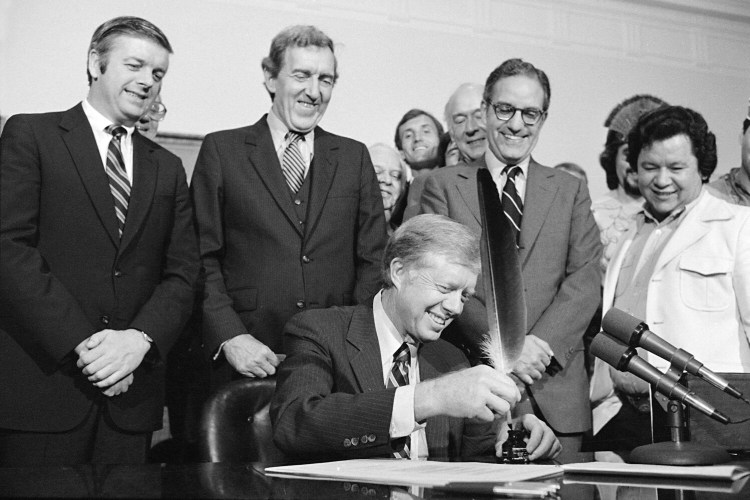Oct. 10, 1980: President Jimmy Carter signs the Maine Indian Claims Settlement Act, ending 1976 lawsuits by the Maliseet, Passamaquoddy and Penobscot tribes, in which they claimed about 12.5 million acres of Maine, or two-thirds of the state’s territory.

Under the new law, the tribes will receive a total of $81.5 million as compensation for land that was taken from them.
The tribes claimed the land was sold to non-Indians in violation of the 1790 Non-Intercourse Act, which forbids the transfer of tribal property without congressional approval. As compensation, the government will give them a $27 million trust fund and another $54 million to buy 300,000 acres of forest from timber management companies.
Carter uses an eagle feather to sign the agreement, with U.S. Secretary of State Edmund Muskie, a former Maine governor and U.S. senator, and Gov. Joseph Brennan in attendance. Andrew Akins, chairman of the Passamaquoddy and Penobscot negotiating committee, and other tribal representatives also witness the event.
“This was one of the most difficult issues I ever got involved in,” the Bangor Daily News reports Carter as saying. “It aroused the animosity of just about everybody.”
The president calls the resolution of the dispute “a reaffirmation that our system works. … This should be a proud day for us all.”
Oct. 10, 2019: The 164-acre Howard Hill Historical Park, which includes two cliffside scenic overlooks providing views of the State House complex, is dedicated in Augusta.
“From a wildlife perspective, Howard Hill has it all. With softwoods and hardwoods, it provides a home or stopping off point for a whole host of wildlife species,” Maine Inland Fisheries and Wildlife Commissioner Judy Camuso says at the ceremony.

A tree house in the Gannett Estate on Western Avenue in Augusta. The steps to the ramp are all that remain on the site, which is now a scenic overlook in Howard Hill Historic Park. Kennebec Journal file photo
The Kennebec Land Trust, using a mix of private and public money – but none from Augusta city funds – bought the land for about $925,000 from local lawyer Sumner Lipman and transferred the title to the city in 2017. The trust retains a conservation easement to the park.
The land trust initially expected to receive $337,500 from the Land for Maine’s Future fund to help pay for the $1.2 million project. Five of the six Land for Maine’s Future board members, however, all appointees or former employees of Gov. Paul LePage, voted to reduce that funding to $163,500, and they cast doubt on the reliability of the property’s $1 million appraisal. The city assesses it for tax purposes at $171,000.
The land trust took out a loan from a local bank to plug the unexpected gap.
LePage, who left office in January 2019, criticized the project repeatedly, as well as Maine land conservation programs generally, and he delayed the sale of bonds to finance the Land for Maine’s Future program.
Howard Hill is named for Capt. James Howard, an 18th-century settler who commanded Fort Western, a 1754 British fort that still stands on the east bank of the Kennebec River in Augusta. Howard’s descendant, William Howard Gannett, a local publishing tycoon, owned and lived next to Ganneston Park, a large wooded estate that encompassed the Howard Hill site. The old park featured gardens, ponds, carriage roads and trails that Gannett allowed the public to use.
Proposals to turn the hill into a park and include “Howard” in its name have roots that reach back more than a century. The July 22, 1905, issue of the Daily Kennebec Journal includes a column proposing that the site be called “Betsey Howard Hill” to replace another, informal name incorporating a racial slur used to describe Black people.
Betsey Howard, the writer explained, was a daughter of Lt. Samuel Howard, Capt. Howard’s brother, who first lived at Fort Halifax, in what is now Winslow. When the French and Indian War ended, he and his family moved to Augusta and acquired the Howard Hill area. After Samuel Howard and his wife died, Betsey Howard continued living on the property until her own death, the writer said.
James North’s 1870 “History of Augusta” confirms most of these details and does not contradict the rest.
The 1905 writer says a Black family moved onto the hill later, resulting in the informal name saddled with a slur, “a designation not at all pleasing or applicable to the place, and one which the colored residents of our city have a right to resent.”
Praising the landscape there, the writer added, “Whether this is ever used for a park or not, it is certainly to be hoped that the magnificent forests which clothe it may be preserved.”
Joseph Owen is an author, retired newspaper editor and board member of the Kennebec Historical Society. Owen’s book, “This Day in Maine,” can be ordered at islandportpress.com. To get a signed copy use promo code signedbyjoe at checkout. Joe can be contacted at: jowen@mainetoday.com.
Comments are not available on this story.
Send questions/comments to the editors.


